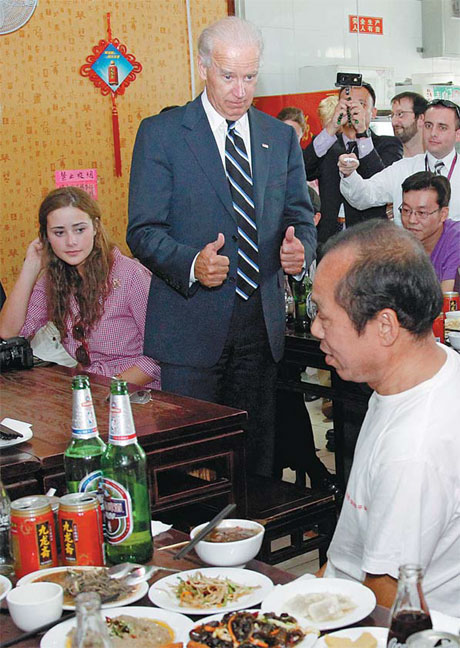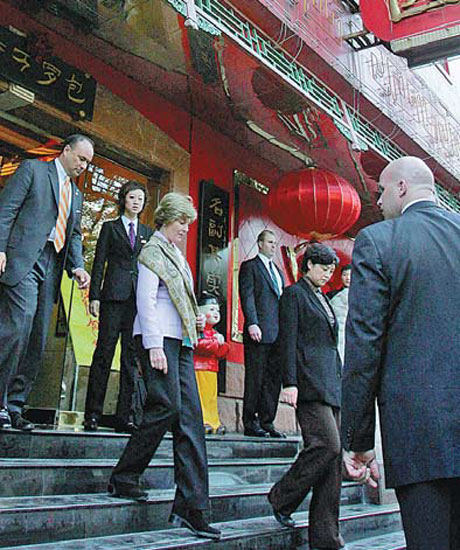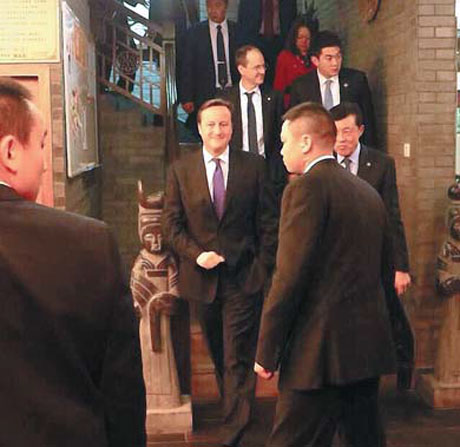A matter of taste
Updated: 2014-03-23 08:08
By Ye Jun(China Daily)
|
|||||||||
|
US Vice-President Joe Biden (center) gives a thumbs-up during lunch at Yao's Chaogan'er Restaurant in Beijing in August 2011. Ng Han Guan / AFP |
|
Former first lady Laura Bush (center) walks out of the Tianjin Baijiaoyuan restaurant where she ate lunch in Beijing in November 2005. Provided to China Daily |
|
British Prime Minister David Cameron enjoys Sichuan's famous spicy hot pot at Xiangtianxia restaurant during his visit to Chengdu in December 2013. Provided to China Daily |
Visiting foreign leaders and their ilk often opt for China's specialties, rather than their home fare. Consequently, the dinner table has become a platform for connecting to ordinary locals. Ye Jun reports.
US first lady Michelle Obama's family made headlines Saturday night when they dined at Da Dong Peking Roast Duck Restaurant.
The first lady had booked a seat but didn't join her mother and daughters at the table.
Like all mortals, heads of state, their spouses and other leaders - and their families - of course have to eat during their time in China. And many opt to go local to get a true taste of China.
Former first lady Laura Bush, for instance, dined at Tianjin Baijiaoyuan, a specialized jiaozi restaurant in Beijing's Xidan area on Nov 20, 2005.
Jiaozi, or boiled dumplings, are a typical food in China. They were traditionally eaten as a special treat during Spring Festival, China's most important celebration. But they're so frequently consumed now that they've become a common meal.
Tianjin Baijiaoyuan is a rather affordable diner, offering both jiaozi and popular home-style fried dishes. The eatery earned a Guinness World Record for producing 229 kinds of jiaozi.
Bush planned to spend 40 minutes on the meal but stayed in the restaurant for 70. Her entourage tried jiaozi with more than 10 stuffings, including pork with celery, tomato and egg, and mutton with coriander. She told management her favorite was pork with beans.
The first lady also ordered fried dishes - mushrooms with soy-marinated pork ribs, quick-fried chicken with walnuts and bean paste, and tender corn kernels with pine nuts.
Bush relished the meal so much that she visited the restaurant again, during the 2008 Beijing Olympic Games.
The restaurant's menu also shows photographs of former US secretary of state Colin Powell, who visited in 2004.
Following Bush's visit, the restaurant developed a "Mrs Bush set menu", attracting throngs of new local customers.
Visiting foreign leaders are usually officially received at a state banquet at the Great Hall of the People or treated to a presidential "home dinner" at the Diaoyutai State Guesthouse.
State banquets are prepared by some of the country's best chefs.
They need to consider not only food quality but also guests' religion, ethnicity, eating habits and, sometimes, health.
Chefs deliberate ingredients' health benefits, nutrition and seasonality.
Much of the porcelain tableware is specially produced by Jiangxi province's Jingdezhen, which is celebrated for fine porcelain.
State banquets usually feature dishes that represent the best of Chinese cuisine.
In October 1986, Deng Xiaoping treated Queen Elizabeth II to "Buddha jumps over the wall" soup. The famous Fujian specialty has more than a century of history and contains up to 20 kinds of seafood and poultry, simmered for hours or days.
It's said former US presidents George Bush and Ronald Reagan loved the soup.
Chinese leaders sometimes introduce their personal favorites at state banquets.
Deng is said to have adored cuttlefish-roe soup, a spicy and sour delicacy hailing from traditional Shandong cuisine. As a result, the warming soup became a regular fixture of state banquets.
It's commonplace for visiting leaders to try Peking roast duck, Beijing's premium culinary icon.
Many dine on duck at Quanjude, an eatery dating to 1864.
The walls of Quanjude's Hepingmen branch have many photos of visiting foreign leaders on the restaurant's second to fourth floors. Among them are former US president Richard Nixon and his national security adviser Henry Kissinger.
Another restaurant Chinese leaders often invite foreign leaders to is Sichuan Fandian, which serves classic Sichuanese cuisine.
Former French president Jacques Chirac's photo is one of many leaders' portraits on the restaurants' walls. The president of a nation renowned for its gourmet offerings visited China at least five times - as Paris' mayor, and as the country's prime minister and president - from 1978-2006.
On Oct 25, 2006, Chirac dined at Tiandi (Heaven and Earth) restaurant in Beijing. The restaurant (now closed) on Nanchizi Dajie (Street) was opposite Tai Miao, the Royal Ancestral Temple.
Chirac made it a point to eat from communal serving plates per Chinese custom, the restaurant's executive chef Yu Li says.
Four Chinese chefs presented six cold dishes, a soup, six hot dishes and three desserts, representing cuisines from Beijing, Shanghai, Guangdong and Jiangsu.
Chirac started with traditional Beijing dim sum. Then he tried Peking duck, quick-fried king prawns, spicy and sour cuttlefish-roe soup with coriander and seasonal stir-fried hairy crab roe with French toast, accompanied by French burgundy.
When he visited Sichuan's provincial capital Chengdu in 2004, he had northern Sichuan starch-noodles and dandan noodles for breakfast, both of which are spicy.
British Prime Minister David Cameron also chose Sichuan's famous spicy hot pot when he visited Chengdu on Dec 4, 2013.
Xiangtianxia hot pot restaurant's sales manager Cao Jing says the prime minister was "very capable of eating spicy foods". He liked the mushroom platter, and ordered two additional plates of coriander meatballs.
His table of diners also ordered beef, lamb, bean curd, lotus roots and cabbage for the hot pot, washed down by the restaurant's home-brewed beer. He didn't order the locally popular beef giblet. But he bought a pack of local green tea.
Cameron's table spent 877 yuan ($141), including 436 yuan on food. That's a relatively cheap meal, considering they also drank beer.
US Vice-President Joe Biden was even thriftier. He spent 79 yuan at Yao's Chaogan'er Restaurant near the Drum and Bell towers in August 2011.
He ordered pork buns, zhajiang (fried brown-bean sauce) noodles and cucumber salad, and two colas. But he didn't sample the liver stew that is the eatery's signature dish.
While Western leaders are treated to refined feasts at state banquets, most otherwise enjoy inexpensive archetypal Chinese dishes.
That has been the trend in China, too. Chinese leader Xi Jinping spent 21 yuan on stuffed buns at a Beijing restaurant last December.
He also treated visiting Kuomintang honorary chairman Lien Chan at the Diaoyutai State Guesthouse to a "home banquet" of Shaanxi noodles, flatbread in lamb soup and sliced cake with mashed pork filling on Feb 18.
These are inexpensive but typical Shaanxi foods, suitable because both Lien and Xi are from Shaanxi province.
That created a new 58-yuan "presidential set menu" in Shaanxi's capital city Xi'an.
Ultimately, the tendency of leaders to opt for relatively ordinary local fare seems to point to a desire - if not a means - to connect with everyday locals.
Consequently, the dinner table has become a platform for the world's elite to relate with ordinary folks.
Contact the writer at yejun@chinadaily.com.cn.
(China Daily 03/23/2014 page7)


